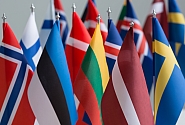
On Friday, 4 September, the parliamentary delegations of Latvia, Estonia, Lithuania, Denmark, Iceland, Norway, Finland, and Sweden (NB8) to the Parliamentary Assembly of the Council of Europe (PACE) adopted a joint statement on the situation in Belarus after the presidential election, expressing firm support to the Belarusian people on their path towards a pluralistic democracy.
"We are urging member states of the Council of Europe to endorse democratic reforms and democratic institutions in Belarus aimed at strengthening these reforms, as well as to support civil society, including independent mass media. Likewise, we call on the Council of Europe with its expertise and experience, in cooperation with other international partners, to offer full support to Belarus in its strive for pluralistic democracy and necessary constitutional reforms,” emphasised Inese Lībiņa-Egnere, head of the Latvian delegation to PACE, with reference to the Statement.
In it, parliamentarians underline that the right to participate in free elections is a fundamental value of democracy and that the freedom of speech and assembly is a basic human right. The Statement also emphasises that current actions of the Belarusian authorities violate internationally recognised human rights norms and principles of democracy.
Parliamentarians express concern about the repressions and violence against representatives of civil society and independent mass media before, during, and after the presidential election in Belarus, condemning the violence and brutality of the special police forces and authorities against demonstrators.
The Baltic and Nordic parliamentarians point out that social dialogue and reforms will improve the development of Belarus by promoting good neighbourly relations in the region, expressing deep regret that Belarus is not a member of the Council of Europe and that the country’s special guest status to the Council of Europe is still suspended.
The Statement calls on the Belarusian authorities to immediately discontinue the use of force and persecution, release all political prisoners and persons who were illegally detained, rehabilitate the released political prisoners and fully restore their civil and political rights, and to conduct an urgent and transparent investigation into the acts of brutality carried out by law enforcement. MPs urge the Belarusian authorities to ensure adherence to democratic principles, human rights, and fundamental rights according to the Universal Declaration of Human Rights and international and regional human rights instruments ratified by Belarus.
They also urge the Belarusian government to start immediate dialogue with the opposition and civil society to prevent further violence and introduce changes that the people of Belarus hold desirable and necessary. Additionally, the Belarusian government is urged to launch a peaceful dialogue aimed at reforming the electoral law.
The Statement urges to hold a new presidential election in line with internationally recognized standards, while providing the opposition with equal access to all state-controlled mass media and allowing the opposition to participate in the election on equal footing. Furthermore, MPs call on Belarus to ensure fair and genuine opportunities for all candidates to engage in pre-election campaigns, to ensure the presence of international observers, as well as equal representation of candidates’ supporters at all levels of electoral committees.
The Statement reaffirms its constant support for the sovereignty of Belarus and the well-being and fundamental rights of the Belarusian people.
Founded in 1949, the Council of Europe is the oldest political organisation in Europe, which currently brings together 47 European countries. The aims of the Council are to protect human rights, parliamentary democracy and the rule of law, to harmonise social and legal standards of its member states, as well as to promote understanding of European identity and values by embracing cultural diversity of European nations. Latvia became a member state of the Council of Europe in 1995.
PACE is a statutory body of the Council of Europe focusing on the protection of human rights, pluralist democracy and rule of law, promotion of the understanding and development of European cultural identity and diversity, and seeking solutions to the problems facing European society, as well as strengthening democratic stability in Europe by supporting political, legislative, and constitutional reforms.
Belarus was granted special guest status in PACE in 1993, which was suspended in 1996, following a national referendum held by president Alexander Lukashenko aimed at further increasing presidential authority that was condemned by PACE as undemocratic.
The NB8 format brings together five Nordic countries – Denmark, Iceland, Norway, Finland, and Sweden – and the three Baltic States – Latvia, Lithuania, and Estonia.
Saeima Press Service







